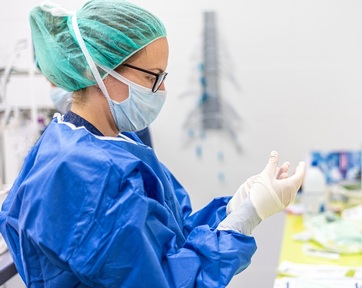Home care leaders welcome no VAT on PPE until 31 July
The Treasury has temporarily scrapped VAT on the sale of essential personal protective equipment (PPE) for all during the coronavirus crisis.

From 1 May, PPE purchased by home care providers, care homes, businesses, charities and individuals to protect against COVID-19 will be free from VAT for a three-month period and will save care providers and businesses more than £100 million. Up till now it was only the NHS that has been exempt from paying VAT.
’It is a good start and we hope that it is followed by further measures’
Care leaders have welcomed the announcement that VAT is to be removed from the purchase of PPE for care providers for the next three months as they fight the coronavirus pandemic.
Colin Angel, policy director of UKHCA which represents home care providers, said: "The news that PPE supplies are to be VAT-free for three months during the pandemic is welcome. Home care providers have found the rapidly rising cost of PPE extremely challenging.
"UKHCA wrote to the Treasury in April asking for the VAT status of social care services to become zero-rated, because home care providers are unable to reclaim the VAT they pay on goods and services they purchase for their business.
"Government has previously said that a change was not possible because of EU agreements on VAT. However, the EU recently indicated support for temporary VAT reliefs during the pandemic. Although yesterday's measure is only for three months, it has proved that Government is able to make emergency changes while the UK is still tied to EU-VAT rules. That tie will end once the Brexit transition period finishes."
The UKHCA said it will continue to campaign for a permanent change to the VAT status of social care.
The chief executive from Care England, Martin Green, said: “Care England welcomes this announcement from HMT as a short term measure to help the adult social care sector during the pandemic.
"Government has at last recognised the role that care homes play on the front line, this recognition and appreciation needs to stretch beyond the immediate time frame.”
Ministers have already removed import duties from PPE to ensure more essential equipment can get to the front line quicker.
The Independent Care Group (ICG) chair, Mike Padgham added: “We are pleased that the Chancellor has listened and taken this step to save some money for social care providers.
“It is a good start and we hope that it is followed by further measures, like efforts to ensure that more funding is given to local authorities so that they can help social care providers and that this help gets to the front line.”
Danielle Bullent, care home manager at Laurel Lodge, operated by Black Swan Care group called it "absolutely wonderful" and said: "We will need more PPE as we're moving forward. It just makes it a bit more easier to access."
The move comes after weeks of demands from charities and unions to scrap the sales tax.
Care leaders including Nadra Ahmed, chair of the National Care Association were concerned PPE sold to care providers was being sold at ‘inflated prices’ and in some cases some care providers had no choice but to pay over ‘400 per cent more.’
The ICG has also called on the government to provide better financial support for care providers amidst concerns that the £3.2bn so far pledged for local authorities to help them support social care is not getting to the front line.
“In the longer term we want a complete review of social care,” says Mr Padgham. "Care providers have been suffering financial hardship for many years due to chronic under-funding. Now they are facing huge increases in costs, for instance the costs of bringing in agency staff to cover for staff who are unwell, sick pay costs and the increasing cost of protective equipment."
Currently, the social care sector looks after 400,000 people in care and nursing homes. This is three times the number in NHS hospital beds. Home care providers look after a further 640,000 people in their own homes.
Latest News
 29-Jul-24
Dementia Bus gives carehome.co.uk staff insight into life with dementia
29-Jul-24
Dementia Bus gives carehome.co.uk staff insight into life with dementia
 01-Mar-24
Find out the top care homes in 2024
01-Mar-24
Find out the top care homes in 2024
 21-Mar-23
UK's top care homes in 2023 revealed
21-Mar-23
UK's top care homes in 2023 revealed
 03-Jan-23
carehome.co.uk launches free care helpline
03-Jan-23
carehome.co.uk launches free care helpline
 13-Dec-22
5 mins with Emily Whitehurst, chief operating officer for Constantia Healthcare
13-Dec-22
5 mins with Emily Whitehurst, chief operating officer for Constantia Healthcare